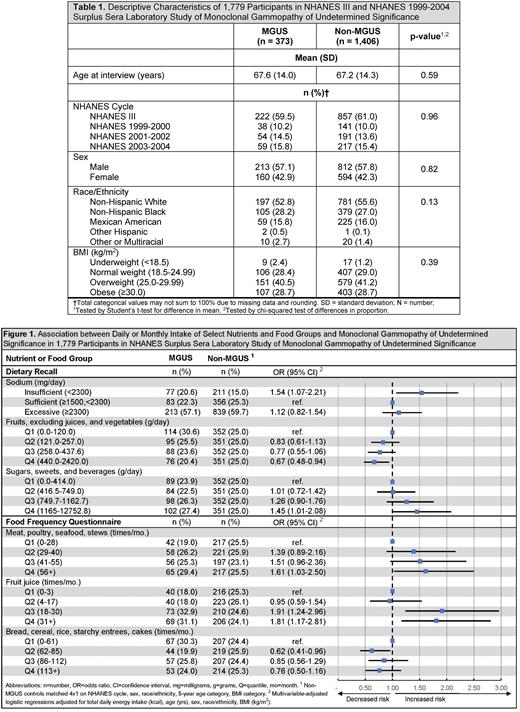Abstract
Introduction
Monoclonal gammopathy of undetermined significance (MGUS) is a plasma cell disorder with a prevalence of about 3% in adults over age 50. The annual average risk of progression to multiple myeloma (MM) is approximately 1%. MGUS has also been reported to be associated with excess risk of cardiac, renal, neurologic, and immune-related conditions. Although inflammatory or insulinemic diets or diets low in plant-based foods have been associated with risk of MM, there is limited information on dietary factors and risk of MGUS from one Icelandic cohort study which focused on Caucasians (Thordardottir et al. 2018). Given that food intake can vary greatly across ethnic/racial groups, we were motivated to conduct a large population-based study including Caucasians, African-Americans, Hispanics, Asians, Pacific Islanders, and other ethnic/racial groups.
Methods
Using the National Health and Nutrition Examination Survey (NHANES), we conducted a case-control study including 373 individuals with MGUS (cases) and 1,406 frequency-matched controls. Diet was characterized by 24-hour dietary recall (DR) and food frequency questionnaire (FFQ). MGUS status was determined by screening. Unconditional multivariable logistic regression analyses were used to model the association between MGUS and daily intake of macronutrients, 18 micronutrients, and nine USDA food groups from the DR, and analogous food groups from the FFQ, with odds ratios (OR) and 95% confidence intervals (CI) for MGUS as the measures of association.
Results
Descriptive characteristics of the study sample are shown in Table 1. Over 40% of the participants were members of racial or ethnic minorities.
Among the micronutrients, only sodium intake achieved significance (Figure 1); individuals with insufficient daily sodium intake were 54% more likely to have MGUS than those with sufficient intake (OR=1.54; 95% CI=1.07-2.21), which could be indicative of individuals with kidney disease or hypertension (both associated with MGUS) or heart failure following low-sodium diets. Excessive sodium intake was not significantly associated with MGUS in this study.
Daily gram intake of "Fruits, excluding juices, and vegetables" was higher in non-MGUS, with the highest quartile associated with 33% lower odds of MGUS (Q4 OR=0.67; 95% CI=0.48-0.94; p for trend=0.02). Daily gram intake of "Sugars, sweets, and beverages" was significantly associated with an increased odds of MGUS (Q4 OR=1.45; 95% CI= 1.01-2.08; p for trend=0.02).
Monthly frequency of intake of "Meat, poultry, seafood, stews" (Q4 OR=1.61; 95% CI=1.03-2.50, p for trend<0.05) was associated with MGUS, with most of the effect coming from processed meat (data not shown). Frequency of intake of "Fruit juice" (Q3 OR=1.91; 95% CI=1.24-2.96; Q4 OR=1.81; 95% CI= 1.17-2.81; p for trend<0.01) was also associated with MGUS. There was a suggestion of an inverse association between monthly intake of "Bread, cereal, rice, starchy entrees, cakes" and MGUS. Compared to Q1, Q2 was significantly associated with reduced risk of MGUS (Q2 OR=0.62; 95% CI=0.41-0.96); Q3 and Q4 supported this trend but were not significant. Most of the category effect was due to dry cereals and yeast breads (data not shown).
No other micronutrient or food group, measured by DR or FFQ, was found to be associated with MGUS.
Conclusions
Our study shows that certain dietary characteristics, including low intake of sodium, fruits and vegetables, and cereals and yeast breads, and high intake of sugars, sweets, and beverages, juices, and processed meat, are associated with MGUS. The identification of novel dietary risk factors for MGUS in a diverse population are of direct public health relevance. The findings of this study also provide rationale for exploration of mechanistic links between diet and the microbiome, immune system, metabolism, and epigenetics, such as the ongoing plant-based diet pilot study at Memorial Sloan Kettering Cancer Center (NCT04920084) and intermittent fasting study at Roswell Park Comprehensive Cancer Center (NCT05312255).
Disclosures
Hillengass:Sanofi: Membership on an entity's Board of Directors or advisory committees; Oncotracker: Membership on an entity's Board of Directors or advisory committees; Oncopeptides: Membership on an entity's Board of Directors or advisory committees; Janssen: Honoraria, Membership on an entity's Board of Directors or advisory committees, Other: DSMB; GSK: Membership on an entity's Board of Directors or advisory committees; Curio Science: Honoraria; BMS: Membership on an entity's Board of Directors or advisory committees; Beijing Medical Award Foundation: Honoraria; Beijing Life Oasis Public Service Center: Honoraria; Beigene: Honoraria; Axxess Network: Membership on an entity's Board of Directors or advisory committees; Amgen: Honoraria; Adaptive: Honoraria; Skyline: Membership on an entity's Board of Directors or advisory committees. Landgren:Amgen: Honoraria, Research Funding; MMRF: Honoraria; Leukemia & Lymphoma Society: Research Funding; Rising Tide Foundation: Research Funding; Tow Foundation: Research Funding; Riney Foundation: Research Funding; NCI/NIH: Research Funding; Aptitude Health: Honoraria; Theradex: Other: Independent Data Monitoring Committee (IDMC) member for clinical trials; Pfizer Inc: Consultancy; Merck & Co., Inc.: Other: Independent Data Monitoring Committee (IDMC) member for clinical trials; Janssen: Honoraria, Other: Independent Data Monitoring Committee (IDMC) member for clinical trials, Research Funding. Usmani:Amgen, BMS, Janssen, Sanofi: Speakers Bureau; Abbvie, Amgen, BMS, Celgene, EdoPharma, Genentech, Gilead, GSK, Janssen,Oncopeptides, Sanofi, Seattle Genetics, SecuraBio, SkylineDX, Takeda, TeneoBio: Consultancy; Amgen, Array Biopharma, BMS, Celgene, GSK, Janssen, Merck, Pharmacyclics, Sanofi, Seattle Genetics, SkylineDX, Takeda: Research Funding. Lesokhin:Serametrix, inc: Patents & Royalties; Trillium Therapeutics: Consultancy, Research Funding; Pfizer, Genmab, Sanofi, Iteos, BMS, Janssen: Consultancy; Janssen, Pfizer, BMS, Genentech/Roche: Research Funding; Janssen, Pfizer, Iteos, Sanofi, Genmab: Honoraria; Sanofi: Research Funding; BMS: Honoraria; Amgen: Honoraria; Memorial Sloan Kettering Cancer Center: Current Employment. Shah:MashUpMD: Honoraria; MJH Lifesciences: Consultancy, Honoraria; Bristol Myers Squibb: Consultancy, Research Funding; Janssen: Consultancy, Research Funding; ACCC: Honoraria; Sanofi: Consultancy.
Author notes
Asterisk with author names denotes non-ASH members.


This feature is available to Subscribers Only
Sign In or Create an Account Close Modal